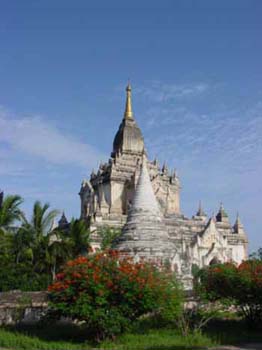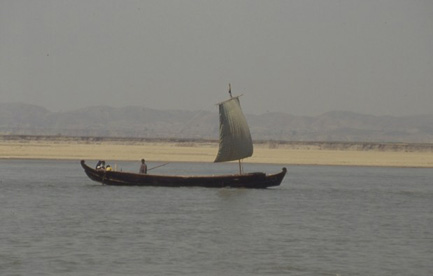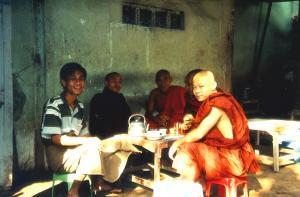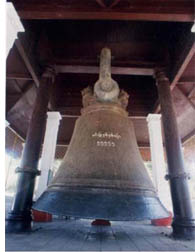|
Gwadapalin Temple, Myanmar |
Travelogue Part 3 Myanmar, continued by Andrew Nickson |
![]() andalay,
fabled city of Kipling’s
poem where the flyingfishes
play and the dawn comes up like thunder over China cross the bay. Much
of this sprawling dusty town he’d still recognise. The centre is
still the two-kilometre long walls of the square royal palace, still standing,
still red and still surrounded by a wide moat.
andalay,
fabled city of Kipling’s
poem where the flyingfishes
play and the dawn comes up like thunder over China cross the bay. Much
of this sprawling dusty town he’d still recognise. The centre is
still the two-kilometre long walls of the square royal palace, still standing,
still red and still surrounded by a wide moat.
|
|
You still get around by rickshaw, bicycle rickshaws called trishaws. It’s still fun to direct the driver to the cheap gin joints on the banks of the mighty Irrawaddy River, still teeming with fishing boats, passenger ferries that look like Mississippi paddle steamers (and with just as many gamblers), the banks covered with fish markets, flower stalls, temples, pagodas, betel nut sellers, black market money changers, sly grog shops, everything you could want.
And most important of all, the tea houses.The tea comes with plates of cakes and Indian savoury samosas and a little plastic stand holding three or four cigarettes. All very civilised apart from the oceans of sweetened condensed milk they drown the tea in. To attract the attention of a waiter or waitress in a Burmese restaurant you make kissing sounds. In most countries this would get you your ears boxed, but in good old Burma you just motion to the waiting person of your choice and kiss away: they then come smilingly over to ask what you want. Wonderful.
|
|
A person could do a whole book just on the tea houses, one of those big coffee-table things with glossy color pictures. Naturally there’d be a chapter on how to stop the smiling teamakers from drowning your tea in sweetened condensed milk and ordinary condensed milk and sugar as well. But a word of warning: you coffee drinkers will have a hard time, coffee comes only in little sachets of 3 in 1 with the coffee, creamer and sugar all mixed together. Laos and Thailand have excellent home-grown coffee, thick, oily, strong. Cambodia has good local coffee, refined and served the French way, like espresso. But Burma, no.
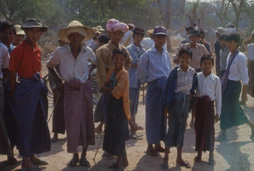 Burmese wearing longyi |
Never mind. Best learn how to drink tea, because, after all, the Burmese experience is to travel back in time to the days of the Raj, the British Empire, and tea is what the colonials drank. Steer clear of the rice spirit that tastes like petrol, but enjoy the palm wine that’s like a mildly alcoholic ginger beer. There’s even a mild rice beer, also tasty. But the Empire rose and fell on tea, and so shall we.Burma’s about the last country for Western styles and values to take over. It’s still rare to see men in trousers; everyone wears the longyi (lon-jee) and because the local currency, the kyat, is badly inflated (currently about 700 to the dollar), the great thick wads of notes (there are no coins, thank heaven) that people have to carry around are stuck in the back of their longyis. So the typical Myanmar resident wears a longyi with a wad of money stuck in the back, chews red-spitting betel nut and /or smokes big fat cheroots of chopped tobacco costing three or four cents each, saving the occasional cigarette for the luxury of the tea house. They also wear a musky powdery face past made from scented wood to cool and beautify, and they’re made more beautiful again because they smile a lot.
The welcome to the visitor is still genuine, the foreigner still an object of curiosity and respect. After they get over the initial shock of you even speaking to them at all, when you ask directions, say, they want to do nothing but talk. There’s still only a trickle of tourists for them to meet and most of these are group tours staying in posh hotels and escorted everywhere. Individual tourists/travellers are starting to come in, but not in the huge numbers that you find in Thailand. Partly it’s because it’s considered politically incorrect to visit a country with such a repressive regime in charge, the military used to own all the hotels, transport and other tourist infrastructure, so visiting meant you were helping to fund this truly evil regime.
But all the smaller guest houses and bus lines and so on that individual tourists use are now privately owned, so it’s now possible to visit and give your money to the local people, not the military. There’s even a private train on one line that’s faster and more comfortable than the government trains which are slower. They all say: don’t boycott, just visit. Everyone loves talking with foreigners—they haven’t had the chance for 40 years—and they will be the ones to introduce the subject of politics. They’re more forthright than before in criticising the government. It’s a healthy trend. Even the monks do it.
 Bus |
Mandalay airport is 45 kilometers of rice fields away from town. You have to share a taxi, no bus. The share taxi system is the best way of travelling between towns, especially if you can get the front seat: three passengers in the back but only one in front. It’s worth the extra dollar for the speed, the comfort, and the clear view. Local buses are crowded, but super cheap and a great way to meet people. When the bus finally gets going, it’s not too slow, but waiting around in the heat for them to fill up is exhausting. There are hundreds of temples in Mandalay, each surrounded by two or three monasteries, as it’s the main Buddhist religious and educational centre. Many of these monks speak excellent English, and one can learn a lot and have interesting conversations with them.
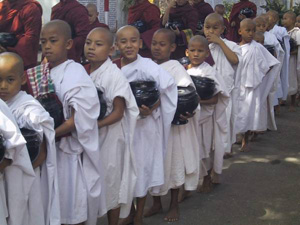 Young novices |
In Laos and Thailand the monks wear bright orange robes: in Burma it’s maroon, and morning is the best time to see them. Mornings are enjoyable everywhere in Asia because it’s cooler, but the morning in Burma offers you one of the world’s great sights. All the monks in the monastery go out with their alms bowls, in single file and descending order of height, the tallest in front down to the smallest littlies of only five or six years old at the end. The chief monk leads this long file. What little traffic there is will wait for them to cross the street, just like car drivers will wait in Australia while a duck followed by her ducklings will cross a road. But in Burma it’s the abbot followed by his monklings. The great game is to make faces at the smaller ones—they’ve never seen a foreigner before so they’ll start to giggle and eventually the whole line will crack up! Try it.
The monks come from all over the country and from all ethnic groups. Myanmar
has a large number of minorities; maybe half or more are ethnic Burmese.
The others include the Shan, who look and sound like Thais, the Karen,
Mon, Kaya, Wa, Kachin, Chin…there are more than 50 groups, including
the ladies who stretch andlengthen their poor necks with heavy brass rings
because the men think this makes them look beautiful. On the border areas
with China, Laos and Thailand, the ethnics are still growing the opium
poppy. They have an agreement with the central government in Rangoon (now
called Yangon) to stop production by mid-2005, but will beans produce
the same profit?
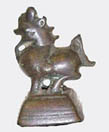 Opium weight |
Maybe the opium growers can generate some post-opium income by selling the weights they use to measure the amounts of the raw product. Opium poppies used to be a common suburban garden flower in Australia, you still see some around. Not the yellow and orange variety, but one leafier and with a red or white flower. The opium weights are cast in bronze in bird or animal shape: an elephant, say, or a mythological lion, and range from tiny ones weighing less than an ounce through to ones weighing three or four kilograms. There might be a dozen in a full set. You can find them in markets, and they’d make very attractive, distinctive souvenirs. Mind you, carrying a whole set around would be very heavy work!
|
|
Myanmar has had numerous kingdoms centered in different parts of the country, so there are former capitals everywhere, most in a very romantic state of ruin and decay. Imposing temples, pagodas, royal palaces, city walls. Around Mandalay itself there are six or seven former capitals alone. One of them has the world’s largest cast iron bell, made for what was going to be the country’s largest temple: the base alone rose 100 feet but was split in an earthquake in 1780 and left unfinished. To get there you sail up the Irrawaddy atop a small boat, sipping Mandalay beer under a canvas awning, sprawled in a deck chair, waving at the passing fishing boats with their wide, brightly coloured sails. What a life!
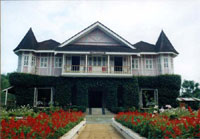 Maymyo |
There are mountains near Mandalay where the British, God bless ‘em, built hill stations, just like they did in India. They’d escape there when the plains became too hot in summer. One hill station, Maymyo, named for its founder, Colonel May, although it now of course has a long unpronounceableBurmese name, has a unique form of local transport: four-seater wooden stage coaches pulled by small horses. Real stage coaches but smaller, each painted with different rural scenes and patterns. Maymyo’s only about 4000 feet, but that’s enough to make it cooler and more lushly forested than the river plains below. The British built Tudor-style houses there just like those at home in dear old England, with gardens of marigolds and roses out the front, apple trees and willows in the back. Plus the town’s full of boarding schools—their children can be educated away from the heat and bustle of town. All these buildings are still there and still used, though of course the colonials have long gone.
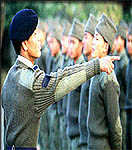 Nepali Ghurkas |
Other nearby small hill towns have a sprinkling of Nepali Gurkhas, descendants of troops the British brought in because they were such fearless fighters. There are also people of Indian descent, some Hindus but mostly Muslim, many of whom are traders and merchants. But although Myanmar’s a real mixture, the majority are strongly Buddhist. The temples are full of people meditating and praying in the morning before work. The grounds will be full of cool, quiet shrines and pavilions among the sacred trees, containing many images of the Buddha in alabaster, marble, onyx, jade or gold. Out front will be statues of a huge pair of animals guarding the entrance, usually the mythological lion that features on the currency, but occasionally giant elephants or horses or even roosters.
And towering above all, resembling a huge inverted golf tee, will be the white or gold spire of the largest pagoda, encrusted with rubies, sapphires and other precious stones. Hanging from the top will be small beaten brass bells in the shape of leaves from the sacred Buddha tree tinkling gently in the wind. The higher, the better, it seems, for every hill has its pagodas flashing in the sun. Every town has its own special hill covered with such shrines and temples, popular spots for picnics, families and courting couples who usually pedal there by bicycle, still the most common form of transport. But motor bikes are creeping in—will it all become as noisy as it is with their more affluent neighbours? Heaven forbid! The bikes are mostly cheapies from China. People say they often seize up when moving, catapulting the driver onto the road in front, causing many fatal accidents.
Mandalay was badly bombed in World War II. Although the town sprawls many miles, the only buildings more than two floors are the new tourist hotels—these usually stop at five floors as they never have lifts. You have to climb halfway to heaven to get to the cheapest rooms on the roof. But even these cheapies usually provide breakfast. It’s always the same: toast, eggs, tea or coffee and a banana or two. There are some great old wooden hotels built by the British still left; you can have a huge room with four beds, a smoking room, a balcony and a huge bathroom, all with river or forest views. They used to be expensive, but with new hotels going up, these unmaintained oldies became bargains. One hotel in Shan state, near Thailand, was originally built as a mansion for the third wife of the Shan king; he had seven. You can now have a room with a four-poster mosquito-netted bed in this palace for $3.00.
The wood in building was all, of course, teak. You can recognise teak trees by their huge leaves, two foot long and more, and their sprays of flowerlike seeds. It’s always been Burma’s most famous and best-known product. But there’s a huge ruby industry too. Ruby-mining areas are off limits to foreigners, but the locals will tell you most of the top quality stones are smuggled out of the country. The chap in the Nepali restaurant next to the ice cream shop in Mandalay is in on it; he gets paid to smuggle them to Thailand, in wax up his bum. After he crosses the border, he’s an illegal immigrant, but a van is waiting to take him to Bangkok, hidden in the back, for 1000 baht (maybe $5.00). Thais will do anything for money: the police, the government, the judges, they’re all in for a penny, in for a pound, more if they can get it. Small bribes to police, customs officials, etc. are called tea money. If you’re worried about crossing a border, just slip a little tea money into your passport when handing it over to get chopped and you’ll have no problems. As the night watchman explained in court: "I tried to stop him, your honour, but he forced his way through by putting money in my hand."
But as with everywhere in Asia, you just can’t be in a hurry. Wait long enough and the problem will resolve itself. Get upset at having missed the train? They’ll say, "Relax. No problem. There’s another train in three days." Ferry landing washed away in a storm the previous evening? Worried about the delay? They’ll say, "Relax. It’ll only take four or five hours to build a temporary landing. Meanwhile, have a cup of tea." Very foreign to our western thinking but seductive after a while. But then they really have no chocie: they have to be patient or go crazy. Their lives are controlled by the government, by the prices of goods in the market, by the prices they get for their agricultural produce because the majority are still farmers. The very weather controls how successful their crops will be. Their Buddhist fatalism teaches: "When the time is right, the way will appear."
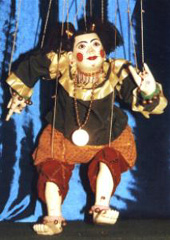 Burmese marionette |
So of course one drinks a lot of tea…waiting…waiting…chatting about this and that, watching the world pass by. The roads are still bad—the British built train lines, not roads—but the original trains and river ferries are still running. Traditional puppet shows are still held—these are intricate 16-stringed marionettes two-feet-high that can flutter their eyelids and do all sorts of subtle movements. The old dusty secondhand books you find on the pavement stalls in the streets are still 50 years out of date, but you can find rare gems this way.
 Nats |
Locals still believe in the 37 nats, spirits or fairies, mostly friendly but a few mischievous, who have to be placated with small offerings at wayside shrines.
Public transport and tea shops. The best ways to meet the locals. A chap who works as a gem cutter by day runs a free English school for local children in his home at night; will you please come and help us?
A farmer in town to treat malaria told a story that every rural community
since the world began must have a version of…A farmer keeps a particularly
aggressive bull in a paddock by his house. A stranger hurrying by asks
him, "If I take a shortcut across that field, will I be in time to
make the four o’clock train?" Farmer looks at him and replies,
"If you take a shortcut across that field, you might make the three
o’clock train!"
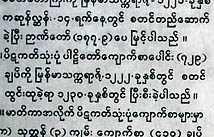 Burmese script |
A guesthouse owner is a writer who has won several literary awards: please accept these books as a souvenir of our meeting (they were all in Burmese script which is based on the perfect circle).
A 70-year-old Australian turns up. Formerly from Brisbane, he’s been married to a mountain lady for the past 12 years. She has two daughters from a previous marriage, one of whom had won the Miss Mandalay contest (he had photographs). She should have won the Miss Myanmar finals in Rangoon but the prize was given to the mistress of one of the military government’s generals. Surprise, surprise.
The wife’s family are all army people. She said an army truck with 22 soldiers aboard ran off a steep cliff and all were killed, but it never made the news. She says this is typical—you only hear what the army wants you to hear. Everything is heavily censored, so on TV (two channels, both government), you get politically innocent stuff like folk dancing and maths lessons, though there’s a very popular soap opera or two. (The Miss Mandalay is an English-speaking tourist guide. I have her card if anyone’s interested.)
A chap comes in who works on a floating restaurant on the river near the country’s biggest tourist attraction, Bagan, where there are hundreds of fabulous huge temples that were invaded and destroyed by Kublai Khan but are still magnificent). He says it’s a good job and the tourists are mostly okay. Says Americans are the best tippers, the French the worst. Tourist season is the "cool," dry period November to March. The rest of the year he paints designs on traditional lacquerware bowls. A ticket seller from the bus stand opposite says his wife beats him if he comes home tipsy. I ask, "What do you do when your wife beats you?" He replies, "I hide under the blanket." Even those who can’t speak English give you their address anyway.
One respected gent, who has converted his solid teak villa into a guest house should have been an MP in Rangoon for years by now; he won the election for his area when the democratic party led by Aung San Suu Kyi romped home. Army didn’t like the result, results annulled, parliament dissolved, and Kyi has been under house arrest ever since. This chap said there are reasonable elements in the army but there’s a constant battle within its ranks between the liberals and the hard-liners. Says outsiders can’t do much, depends on who wins the internal battles. At the moment the hard-liners are on top.
See Burma before the hordes arrive and the country develops and Westernises. Of course, they should have decent roads, schools, hospitals, transport, tractors, cars, televisions and so on like the rest of us, but if you want to step back sixty years or more in time, then Burma’s your place. Wood is still the most common building material: nothing is quite so pleasant to the feet as walking on a polished wood floor, so it’s only natural that you remove your shoes when coming in from the street. People fly kites after work instead of watching the box. Orchid-growing is a popular hobby, often grown in coconut-shell husks or fretwork wooden boxes. People sit patiently and fish in rivers, canals, lakes and ponds. They nap in hammocks in the noonday heat and meet in the tea shops late afternoon and early evening. They’re friendly, they speak English—it’s enough.
—Australia 2005
Andrew Nickson was born in Melbourne, Australia and educated in England and France. He has temporarily made his home in India, China, the U.S. and France but has spent most of his fascinating life traveling and reading literary works from all over the world. He claims to have visited every nation on earth.
Copyright©EighthSquare.com P.O. Box 580, New York, NY 10113

